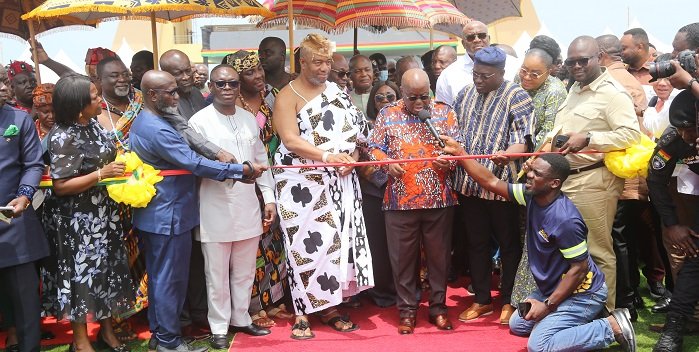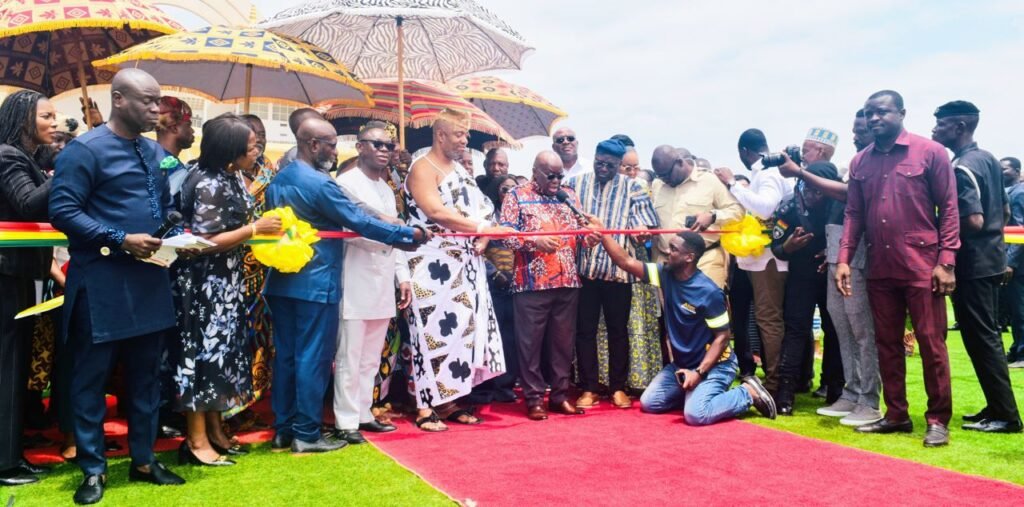
PRESIDENT Nana Addo Dankwa Akufo-Addo yesterday presented a fleet of 2,240 units of heavy duty equipment to all 265 Metropolitan, Municipal and District Assemblies (MMDAs) in the country to enable them maintain, rehabilitate and upgrade, urban and feeder roads in their respective areas.
The fleet procured under the District Road Improvement Programme (DRIP), included motor graders, backloaders, rollers, wheel loaders, bulldozers, tipper trucks, concrete mixers, water tankers, low beds and other essential equipment.

DRIP is a new initiative of the government geared towards enhancing the country’s road network while decentralising development and improving the quality of lives of Ghanaians.
As part of the initiative each of the 265 districts will have a standing committee comprising a technical officer from the Ministry of Local Government, Decentralisation and Rural Development (MLGRD), one technical officer from the Ministry of Roads and Highways and one person from the 48 Engineers Regiment of the Ghana Armed Forces.

The committee will be chaired by the respective MMDCEs and will be tasked with the responsibility of ensuring the highest standards of quality and accountability in the execution of road projects across the country.
At a twin ceremony to outdoor the new initiative and also present the equipment to the respective assemblies, President Akufo-Addo said DRIP marked an important milestone in the country’s pursuit of infrastructural development.
He said the machines were not merely tools, but instruments of change, enablers of progress, and symbols of our dedication in improving the lives of all Ghanaians.
President Akufo-Addo said the implementation of programme although ambitious would lead to the creation of some 10,000 jobs for mechanics, engineers and artisans in the country.
He said the critical role of road infrastructure in economic growth and social development required that government worked assiduously to improve road network in the country, stressing that “Roads connect communities, facilitate trade, enable access to education and healthcare, and ultimately improve the quality of life for the citizenry.”
President Akufo-Addo noted that despite significant progress made in the expansion of the country’s road network, there still remained many districts whose roads remained in poor condition, impeding economic activities and development.
To this end he said the DRIP had been designed to empower MMDAs with the necessary resources and equipment to rehabilitate and maintain roads within their areas.
This initiative he said aligned with the government’s commitment to decentralisation and providing local authorities with the tools to effect meaningful change.
President Akufo-Addo said his government had completed a total of 12,830 kilometres of roads across the country while adding six interchanges to the existing ones.
This he said was a significant increase compared to the 4,636 kilometres and five interchanges completed during the Mills/ Mahama era from 2009 to 2016, stressing that “Current projects include 10 new interchanges, with five expected to be completed by the end of the year and five more by 2025.”
President Akufo-Addo urged all the beneficiary MMDCEs to adhere to the operational manual issued by supervising ministries and stakeholders and ensure proper use and maintenance of the equipment.
He also called on the Ministry of Local Government, Decentralisation and Rural Development to establish monitoring and evaluation mechanisms to track progress and ensure accountability.
The Minister of Local Government, Martin Adjei Mensah Korsah, on his part said DRIP was the biggest effort ever in the nation’s history in terms of empowering District Assemblies to carry out timely, effective and efficient maintenance of roads within their jurisdiction.
He said even though the biggest threat to the project was the lack of proper maintenance and misuse especially for private endeavours, the Ministry had put in place a number of measures to forestall that and ensure that they were maintained.
Mr Korsah said through the programme steps had been taken to train operators, drivers and technicians as part of the overall implementation of the maintenance protocols and to ensure successful implementation of DRIP.
“We have established stringent monitoring controls both digitally and by a well-crafted team made up of stakeholder, Ministries and would demand strict compliance. This is to ensure sustainability of the Programme and proper use of these equipment,” he said.
The Administrator of District Assemblies Common Fund (DACF), Irene Naa Torshie Addo-Lartey, said a funder of DRIP, the DACF was committed to supporting the initiative in the long haul to significantly improve the road networks at the districts.
This she said was to facilitate the free movement of goods and people, enhance transportation of farm produce to reduce post-harvest losses, open new markets for local farmers and improve access to health care, among other benefits and thereby contribute to the overall improvement of quality of life.





